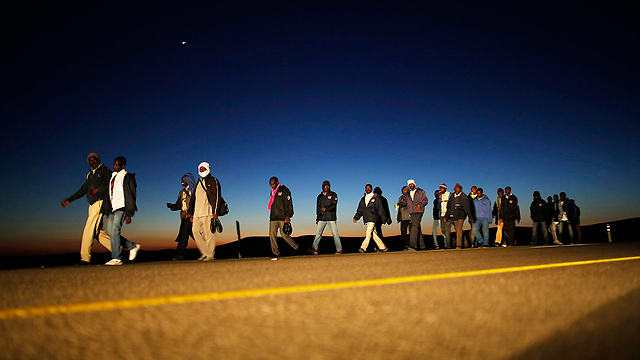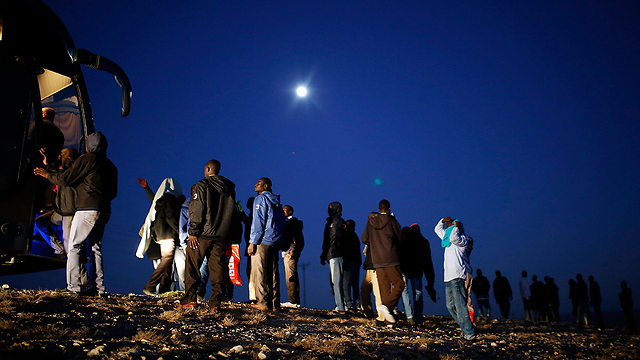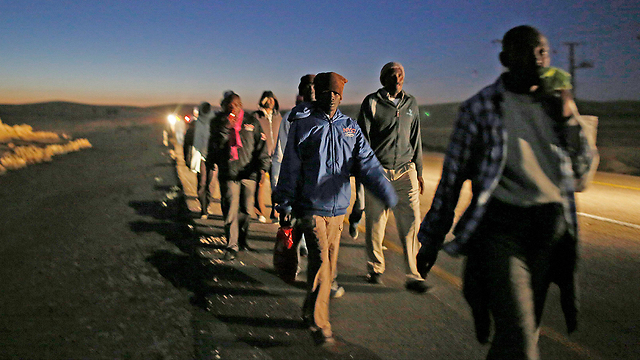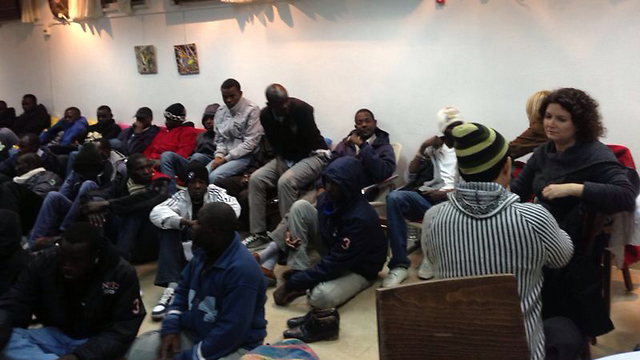The migrants were joined by activists and members of Knesset. They were accompanied for part of the march by police officers and immigration inspectors. The marchers plan to spend the night at Kibbutz Nahshon.
Related stories:
- Following opening: Infiltrators flee from Holot facility
- New migrants' detention facility gears for opening
- Knesset approves Infiltration Prevention Bill
More than 50,000 Sudanese and Eritrean migrants have crossed the border into Israel on foot from Egypt since 2006. The government has tried to encourage most of them to leave.
Many of the migrants say they are fleeing persecution, forced military conscription or dictatorship in African countries.
The center in southern Israel was opened last week after parliamentary approval of a law allowing the open-ended detention of migrants in the facility pending resolution of their asylum requests, implementation of deportation orders or voluntary repatriation.
The detention center, which housed about 400 migrants who had been moved from the Saharonim facility, allows detainees to leave during the day but requires them to return at nightfall.
Cheska Katz, of the Hotline for Refugees and Migrants rights group, said that 135 men, mostly from Sudan, decided not to return to the center on Sunday night and instead set out for Jerusalem, about 75 km (45 mi) away.
An Israeli immigration official told the radio station that the protesters had up to 48 hours to return to the facility or face detention in a standard jail.
"They aren't trying to elude the authorities. Their aim is to reach the Knesset (parliament) and ask for their freedom and to be recognized as refugees," the activist, who is taking part in the march, said by telephone.
One of the detainees on the march, Mubarak Ali, told Israel Radio: "We want them to know that we are still in a prison ... (although) they call it open detention."
Mohammad, an asylum seeker from Darfur, told Ynet: "We are marching for our freedom. The State of Israel is not giving us our rights. We demand they go over our asylum requests. We were jailed for months at Saharonim, without the ability to communicate with the outside world. Now we are asking to be heard."
An Israeli police spokesman had no immediate comment on whether police would prevent the group from reaching the city.
According to authorities, more than half of the migrants transferred to Holot from Saharonim have abandoned the facility, which was built at a cost of millions of shekels.
The Population and Immigration Authority stated: "Human rights organizations are operating against the letter of the law and sabotaging its implementation when they convince the 'infiltrators' not to return to the facility."
The statement continued, "Without a doubt, they didn't return to the facility not because of the conditions, but – according to them – they simply want to work. The Population and Immigration Authority will operate according to the law towards 'infiltrators' who do not return to the open detention facility."
Need for humane, realistic solution
The authorities had expected the migrants to abandon the facility, as the first group to enter the open detention facility had been previously imprisoned at Saharonim for over a year. Despite the immediate setback, immigration authorities will bring other groups of migrants to the facility.
MK Michal Rozin (Meretz), the chair of the Knesset's Committee on Foreign Workers, told Ynet: "This expected fiasco breaks the heart. I hope the radical events of the last few days will convince the government… to find a solution that is humane, sensible, and realistic for the asylum seekers, south Tel Aviv, and our collective humanity."
The protest coincided with an appeal filed in Israel's Supreme Court by human rights groups against the new law, which also stipulated that new migrants caught entering the country illegally could be jailed in a standard prison for up to a year.
The legislation replaced a previous law, annulled by the court last September, which had set a maximum three-year period of detention without charge for migrants.
A fortified fence built along the Egyptian border has halted the migrant flow since last year, but the presence of tens of thousands in the country is widely viewed as a threat to the Jewish State's demographics.
- Receive Ynetnews updates
directly to your desktop



















